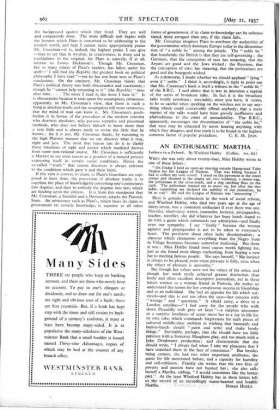AN ENTHUSIASTIC MARTHA _ Letters to a Friend. By Winifred
Holtby. (Collins. tos. 6d,) WHEN she was only about twenty-four, Miss Holtby wrote in one of these letters : " On Friday I held an open-air meeting outside Hampstead Tube Station for the League of Nations. That was killing because I had to collect my own crowd. I stood on the pavement at the street corner and shouted to the empty air, two workmen, a motor-van, the policeman at the cross-roads, and a dog catching fleas on the curb. The policeman wanted me to move on, but after the two ladies supporting me declared the nobility of our .intentions, he let us stay ! He said the League of Nations was ' interesting '."
Here is genuine enthusiasm in the work of social reform,
and Winifred Holtby, who died two years ago at the age of thirty-seven, was a consistent enthusiast if ever there was one. Novelist, short-story writer, journalist, lecturer, propagandist, teacher, traveller, she did whatever her busy hands found to do with a gusto which commands our admiration—and finally even our sympathy. I say " finally " because the woman agitator and propagandist is not to be taken to everyone's heart. The persistent shout often lacks discrimination ; a
clamour which champions everything from the .Negro State to Village Institutes becomes somewhat deafening. But there
it was : Miss Holtby found most causes worth fighting for, just as she found most things enchanting, from buying a new hat to meeting famous people. She says herself, " My instinct is always to be pleased, even when pleasure is folly, even when the object of pleasure is unworthy."
But though her values were not the values of the artist, and though her work rarely achieved greater distinction than lively and often excellent descriptive journalism, yet in these letters written to a woman friend in Pretoria, she makes us understand the reason for her conspicuous success in friendship and as an individual. She had an appetite for life which sur- vived—and this is not too often the case—her concern with " wrongs " and " questions." A ribald story, a drive in a London omnibus—" I feel sorry for the people who walk down Piccadilly with grey set faces "—a surprise encounter or a surprise loveliness of scene move her to a joy in life for its own sake, which commands forgiveness for such pieces of cultured middle-class snobism as wishing that barmaids and button-hands should " paint and write and make lovely things." Inevitable, perhaps, that she should have too little
patience with a Somerset Maugham play, and too much with a. John Drinkwater, production ; and characteristic that she should write, " I always feel when I take my pleasures that I have snatched them in 'the face of conscience." But besides
being earnest, she had two other important attributes, the gusto for life mentioned before, and a capacity for humility and self-criticism. Frankly she writes that the two fires of
poverty and passion have not burned her ; she also calls herself a Martha, adding, " I would sometimes like the better t
part." As the least Winifred Holtby has in these letters left us the record of an exceedingly warm-hearted and lovable














































 Previous page
Previous page